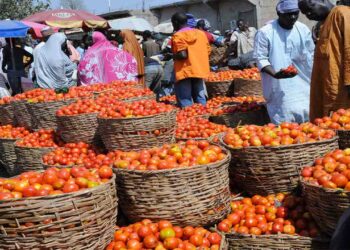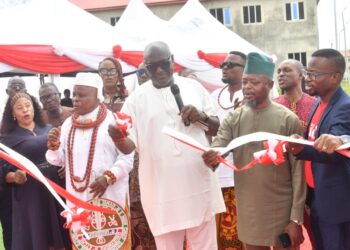The Nigerian Ports Authority (NPA), on Tuesday, said it is procuring technology called the Vessel Tracking Service (VTS) to identify, locate and monitor all vessels on the nation’s territorial waters.
The technology will identity vessels even when such vessels switch off their Automatic Identification System(AIS).
Speaking in Abuja on Tuesday during the 55th session of State House briefing which was monitored via live stream on YouTube, the managing director of the NPA, Mohammed Bello-Koko, stated that the Authority currently does not have the technology to detect vessels when they turn off their AIS in the nation’s territorial waters.
Koko, who was speaking against the backdrop of a recent incident where vessels were apprehended for allegedly in possession of stolen crude, said, rogue vessels that engage in crude oil theft on Nigerian waters go undetected because they turn off their AIS.
According to him, the agency has been trying to acquire the VTS for about 10 years now and has just identified a certified consultant, while also working with the Nigeria Liquefied and Natural Gas (NLNG) company to help with critical detection.
He, however, assured that the technology will be procured before the end of the administration of president Muhammadu Buhari.
However, the NPA boss said, the business of using barges to move containers from the port to off-dock locations has grown to about N10 billion annual business as more shippers adopt alternative means of moving their containers from the mother port to off-dock location.
Since the introduction of cargo movement using barges, over 500,000 twenty-foot equivalent units of container (TEUs) have been moved through the channels from one location to the another.
He said the container barge industry, which has grown to about N10 billion annual businesses, has also created over 25,000 direct and indirect jobs.
According to him, the NPA in the past was relying completely on cargo evacuation by road, until it realised that moving 100 per cent of imports and export by road is not efficient or sustainable.
“But working with the Nigerian Railway Corporations (NRC), the NPA ensured that the rail lines were connected to the port. We also introduced barge operation for movement of cargoes from one location to another off-dock location,” he said.
On the efforts of the NPA in reducing the red tape and bureaucratic bottlenecks hindering effective export trade, Bello-Koko said the NPA, Customs, and other government agencies are working together to deploy the National Single Window, a platform that would make it easier, and will help to reduce the quantum of documents that an exporter has to fill before his or her export cargo can leave the port.
On the vandalisation of port infrastructure, the NPA boss said, Nigeria is losing a lot of money to the issue of stolen fairway buoys on the port channels.





